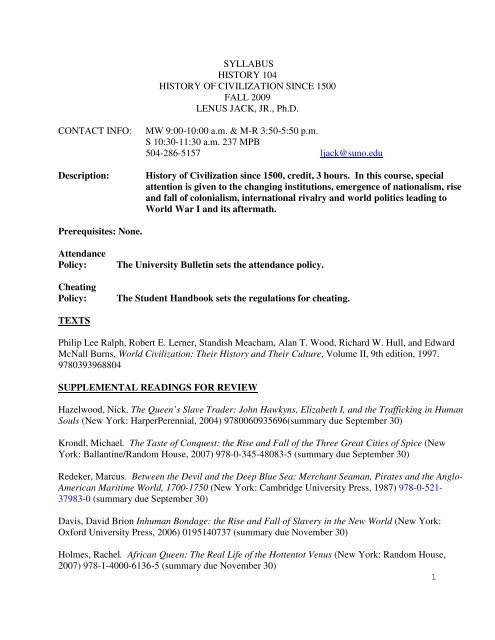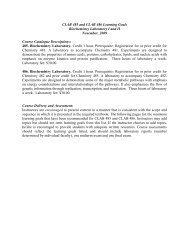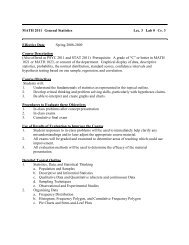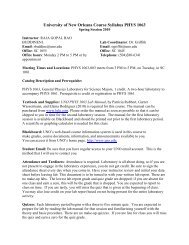1 SYLLABUS HISTORY 104 HISTORY OF CIVILIZATION SINCE ...
1 SYLLABUS HISTORY 104 HISTORY OF CIVILIZATION SINCE ...
1 SYLLABUS HISTORY 104 HISTORY OF CIVILIZATION SINCE ...
You also want an ePaper? Increase the reach of your titles
YUMPU automatically turns print PDFs into web optimized ePapers that Google loves.
<strong>SYLLABUS</strong><br />
<strong>HISTORY</strong> <strong>104</strong><br />
<strong>HISTORY</strong> <strong>OF</strong> <strong>CIVILIZATION</strong> <strong>SINCE</strong> 1500<br />
FALL 2009<br />
LENUS JACK, JR., Ph.D.<br />
CONTACT INFO: MW 9:00-10:00 a.m. & M-R 3:50-5:50 p.m.<br />
S 10:30-11:30 a.m. 237 MPB<br />
504-286-5157 ljack@suno.edu<br />
Description: History of Civilization since 1500, credit, 3 hours. In this course, special<br />
attention is given to the changing institutions, emergence of nationalism, rise<br />
and fall of colonialism, international rivalry and world politics leading to<br />
World War I and its aftermath.<br />
Prerequisites: None.<br />
Attendance<br />
Policy: The University Bulletin sets the attendance policy.<br />
Cheating<br />
Policy: The Student Handbook sets the regulations for cheating.<br />
TEXTS<br />
Philip Lee Ralph, Robert E. Lerner, Standish Meacham, Alan T. Wood, Richard W. Hull, and Edward<br />
McNall Burns, World Civilization: Their History and Their Culture, Volume II, 9th edition, 1997.<br />
9780393968804<br />
SUPPLEMENTAL READINGS FOR REVIEW<br />
Hazelwood, Nick. The Queen’s Slave Trader: John Hawkyns, Elizabeth I, and the Trafficking in Human<br />
Souls (New York: HarperPerennial, 2004) 9780060935696(summary due September 30)<br />
Krondl, Michael. The Taste of Conquest: the Rise and Fall of the Three Great Cities of Spice (New<br />
York: Ballantine/Random House, 2007) 978-0-345-48083-5 (summary due September 30)<br />
Redeker, Marcus. Between the Devil and the Deep Blue Sea: Merchant Seaman, Pirates and the Anglo-<br />
American Maritime World, 1700-1750 (New York: Cambridge University Press, 1987) 978-0-521-<br />
37983-0 (summary due September 30)<br />
Davis, David Brion Inhuman Bondage: the Rise and Fall of Slavery in the New World (New York:<br />
Oxford University Press, 2006) 0195140737 (summary due November 30)<br />
Holmes, Rachel. African Queen: The Real Life of the Hottentot Venus (New York: Random House,<br />
2007) 978-1-4000-6136-5 (summary due November 30)<br />
1
Chomsky, Noam. Pirates and Emperors, Old and New: International Terrorism in the Real World<br />
(Cambridge, MA: South End Press, 2002) 0-89608-685-2 (summary due November 30)<br />
Gaddis, John Lewis. The Cold War: A New History (New York: Penguin, 2007) 978-0-14-303827-6<br />
(summary due November 30)<br />
OBJECTIVES<br />
1. The ability to explain and evaluate types of governmental systems employed, diplomacy and the<br />
nature of the legal system.<br />
2. The ability to account for the diversity evident in the patterns of social organization, economic<br />
systems, artistic and scientific developments, and intellectual perspectives which characterize<br />
each society.<br />
3. Competency in describing and assessing the importance of the military systems utilized.<br />
4. Skill in clarifying the meaning and importance of forms of religion practiced, major deities,<br />
myths, rites and rituals, and priests along with major events.<br />
5. Knowledge of principal magistrates, military commanders, religious leaders, artists and<br />
philosophers in each society.<br />
6. The ability to assess and value the achievements of individuals and groups.<br />
7. Competency in oral and written communication.<br />
8. Successful completion of the course.<br />
EVALUATION MEASURES<br />
1. The final grade will be determined as follows:<br />
Book chapter summaries/1 page per chapter (2) 20%<br />
Examinations (3 of 4) 60%<br />
Class Participation/Journal Assignments 20%<br />
2. Grading Scale<br />
90% A<br />
80% B<br />
70% C<br />
60% D<br />
below 60% F<br />
2
3. All critical book reviews are a maximum of three pages in length. They must have a meaningful<br />
title, an introduction, a body, and it may have a conclusion. All papers will be graded on both<br />
mechanics and content and must meet University standards. The audience for which you should<br />
write your papers consists of your classmates.<br />
Three reviews may be submitted only two are required. The lowest grade will be dropped. No<br />
late assignments will be accepted. Late assignments and missed assignments will count as the<br />
lowest grade. There will be no make-up assignments.<br />
Reviews are subject to a failing grade if the paper has no title, is not double spaced, is four<br />
paragraphs or less, or is not typed.<br />
4. There will be four identification examinations - including the final. All examinations are graded<br />
equally. The lowest grade will be dropped. Missed examinations count as zero and will count as<br />
the lowest grade. There will be no make-up examinations.<br />
5. Join the class discussion. Your ideas will help your classmates by giving them a view other than<br />
the instructor's.<br />
Perhaps the most important single thing is to take notes. Remember, note taking is a learned<br />
skill that gets better the more you use it. Evidence proves the better the classroom notes, the<br />
better the examination grade. The instructor will help you get started and will periodically<br />
review your notes during your office visits.<br />
6. Students enrolled in Western Civilization will keep a journal to track their competence in cultural<br />
literacy. Your instructor throughout the semester will check journals.<br />
7. This syllabus is not a contract.<br />
8. The instructor will determine the grading of student competence.<br />
EXAMINATION DATES PAPER DATES<br />
13 September #1 30 September #1<br />
11 October #2 30 November #2<br />
13 November #3<br />
See final exam schedule<br />
Unit I "Transition to the Modern World: The Scientific and Commercial Revolutions"<br />
3
Reading Assignments: World Civilizations, chapters 22 and 24. See also Indian Givers and Pillaging<br />
the Empire.<br />
Unit II "The Royal State and the New European Powers"<br />
Reading Assignments: World Civilizations, chapter 23, "The Age of Absolutism." For more<br />
information read "The British Lose America," pp. 127-231 in The March of Folly. See also Rice and<br />
Slaves.<br />
Unit III "India, East Asia, and Africa Before European Hegemony"<br />
Reading Assignments: World Civilizations, chapter 21, "India, East Asia, and Africa During the Early-<br />
Modern Era (c. 1500-1800)."<br />
Unit IV "The French Revolution"<br />
Reading Assignment: World Civilizations, "The French Revolution," chapter 25.<br />
Unit V "A New World of Machines"<br />
Reading Assignments: World Civilizations, "The Industrial Revolution," chapter 26. See also Black<br />
London.<br />
Unit VI "New Ideas for a New Europe"<br />
Reading Assignments: World Civilizations, "Consequences of Industrialization: Urbanization and<br />
Class Consciousness (1800-1850)," and "The Rise of Liberalism (1815-1870)".<br />
Unit VII "Realism and Materialism in State-Building and Values"<br />
Reading Assignment: World Civilizations, "Nationalism and Nation-Building (1815-1870)." See also<br />
Blacks in Bondage and Black Woman's Civil War Memoirs<br />
Unit VIII "The New Imperialism"<br />
Reading Assignments: World Civilizations, "International Industrialization and Imperialism (1870-<br />
1914)."<br />
Unit IX "China, Japan, and Africa After European Hegemony"<br />
Reading Assignments: World Civilizations, chapter 33, "China, Japan, and Africa Under the Impact of<br />
the West."<br />
Unit X "The Great War: Legacy of Nationalism, Imperialism, and Secret Alliances"<br />
Reading Assignment: World Civilizations, "The First World War."<br />
Unit XI "Post-War Settlement and New Antagonisms"<br />
Reading Assignment: World Civilizations, "Turmoil Between the Wars."<br />
4
Unit XII "Depression, Totalitarianism, and another World War"<br />
Reading Assignments: World Civilizations, "The Second World War"<br />
Unit XIII "Cold War Polarization and a New World Order"<br />
Reading Assignment: World Civilizations, chapters 37-38.<br />
Unit I "Transition to the Modern World: The Scientific and Commercial Revolutions"<br />
Reading Assignments: World Civilizations, chapters 22 and 24. See also Indian Givers and Pillaging<br />
the Empire.<br />
Topics for Classroom Activities<br />
1. Strengths and weaknesses of the mercantile system<br />
2. Aspects of the Scientific Revolution<br />
3. The Enlightenment and its connection to the French Revolution<br />
Library and Homework Assignments<br />
1. Define or identify each of the following:<br />
Commercial Revolution mercantilism<br />
mathematics Dutch Republic<br />
Copernicus piracy<br />
Kepler Adam Smith<br />
Galileo Jean Baptiste Colbert<br />
Robert Boyle Saint Domingue<br />
William Harvey smuggling<br />
Newton Peace of Westphalia<br />
Descartes Grand Alliance<br />
Sir Francis Bacon War of the Spanish Succession<br />
triangular trade War of Jenkins Ear<br />
mercantilism Seven Years War<br />
joint stock company Peace of Paris<br />
2. Define or identify each of the following:<br />
happiness John Locke<br />
philosophes Catherine the Great<br />
Enlightenment Frederick the Great<br />
entail bourgeois<br />
primogeniture Native American Crops<br />
5
Voltaire George Friedrich Handel<br />
Cesare Beccaria domesticity<br />
Denis Diderot Essay on the Principles of Population<br />
Deism poverty<br />
Immanuel Kant market agriculture<br />
Jean-Jacques Rousseau David Hume<br />
Baron Montesquieu<br />
Reading Assignments<br />
Unit II "The Royal State and the New European Powers"<br />
World Civilizations, chapter 23, "The Age of Absolutism." See also Rice and Slaves and Indian<br />
Givers. For more information read "The British Lose America," pp. 127-231 in The March of Folly.<br />
Topics for Classroom Activities<br />
1. Evolution of the royal state<br />
2. Selling absolute monarchy to the European masses<br />
3. The wars of Louis XIV<br />
4. Peace of Utrecht and political geography<br />
5. Peter the Great<br />
Library and Homework Assignments<br />
1. Define or identify each of the following:<br />
Versailles Peace of Utrecht<br />
divine kings Treaty of Nystad<br />
Shakespeare Catherine the Great<br />
Jean Bodin Frederick William I<br />
Cardinal Richelieu Frederick II, the Great<br />
taxation Maria Theresa<br />
enclosure movement War of the Austrian Succession<br />
Fronde Seven Years' War<br />
Petition of Right Sugar Act<br />
English revolutions American Revolution<br />
absolutism Peter the Great<br />
2. On your outline map, locate and shade in the Greater Antilles and the Lesser Antilles. Locate by<br />
placing the corresponding number on the map:<br />
1. Mediterranean Sea 11. Hispanola<br />
2. Atlantic Ocean 12. Peru<br />
3. Caribbean Sea 13. Mexico<br />
4. Gulf of Mexico 14. Columbia<br />
5. Spain 15. Yucatan Peninsula<br />
6. Portugal 16. Jamaica<br />
7. France 17. Ismust of Panama<br />
8. England 18. Brazil<br />
6
9. Netherlands 19. Pacific<br />
10. Cuba 20. Puerto Rico<br />
Unit III "India, East Asia, and Africa Before European Hegemony"<br />
Reading Assignments<br />
World Civilizations, chapter 21, "India, East Asia, and Africa During the Early-Modern Era (c. 1500-<br />
1800)."<br />
Topics for Classroom Activities<br />
1. India under the Mughal Dynasty<br />
2. China under the early Manchu (Qing) Dynasty<br />
3. Japan under the Tokugawa Shogunate<br />
4. Africa under Divine Rulers and Ritual Chiefs<br />
Library and Homework Assignments<br />
1. Define or identify each of the following:<br />
Babur Nobunaga Asante empire<br />
Akbar shogunate Asiento<br />
Shah Jahan Hideyoshi Ngola<br />
Aurangzeb Tokugawa Ieyasu Queen Nzinga<br />
Sikhs samurai Muscat<br />
Taj Mahal rice merchants Cape Coloreds<br />
Kanxi Kabuki drama new food crops<br />
Qianlong Atlantic slave trade guilds<br />
Jesuits Sao Tome ancestors<br />
Treaty of Nerchinsk Oyo empire Oba<br />
2. On your outline maps, locate and shade in Hindustan, the Deccan, the Punjab, the Sahara and Indian<br />
Ocean. Locate by placing the corresponding number on the map:<br />
1. Afghanistan 16. Manchuria 31. Ngola<br />
2. Kabul 17. Mongolia 32. Kongo<br />
3. Bengal 18. Korea 33. Sao Tome<br />
4. Bay of Bengal 19. Beijing 34. Benin<br />
5. Indus River 20. Burma 35. Kumasi<br />
6. Ganges River 21. Vietnam 36. Arabia<br />
7. Agra 22. Strait of Malacca 37. Malindi<br />
8. Persia 23. Canton 38. Mombasa<br />
9. Pakistan 24. Kyoto 39. Muscat<br />
10. Delhi 25. Edo 40. Osaka<br />
11. Red Sea 26. Nagasaki 41. Cape Town<br />
12. Arabian Sea 27. Mozambique<br />
13. Persian Gulf 28. Gulf of Guinea<br />
14. Goa 29. Congo River<br />
15. Calcutta 30. Madeira islands<br />
7
Unit IV "The French Revolution"<br />
Reading Assignment<br />
World Civilizations, "The French Revolution," chapter 25.<br />
Topics for Classroom Activities<br />
1. The Crisis of the Old Regime<br />
2. The stages of the French Revolution<br />
3. Napoleon Bonaparte<br />
Library and Homework Assignments<br />
1. Define or identify each of the following:<br />
Marie Antionette Oath of the Tennis Court<br />
Enlightenment National Assembly<br />
Old Regime Bastille<br />
Louis XV National Guard<br />
parlements Pope Pius VI<br />
intendants Declaration of Rights of Man<br />
Louis XVI Toussaint L'Ouverture<br />
Regressive Taxes National Convention<br />
Jacque Necker Robespierre<br />
absolutism Napoleon<br />
Bourgeoisie Napoleonic Code<br />
Estates-General Continental System<br />
Mirabeau Waterloo<br />
Unit V “A New World of Machines"<br />
Reading Assignments<br />
World Civilizations, "The Industrial Revolution," chapter 26.<br />
Topics for Classroom Activities<br />
1. Benefits to humankind by industrialization<br />
2. Impact of industrialization on the environment, social institutions (the family, for example) and the<br />
quality of life<br />
3. Problems society faces today that have roots in the 19th century's unrestrained industrialization<br />
Library and Homework Assignments<br />
1. Define or identify each of the following:<br />
Agricultural Revolution George Stephenson<br />
cottage industry Robert Owen<br />
8
putting-out system potato<br />
enclosure movement beggars<br />
market economy serf<br />
canal Edwin Chadwick<br />
coal "Great Hunger"<br />
Thomas Newcomen Crystal Palace<br />
James Watt Friedrich Engels<br />
Richard Arkwright cotton<br />
tariffs factory system<br />
Unit VI "New Ideas for a New Europe"<br />
Reading Assignments<br />
World Civilizations, "Consequences of Industrialization: Urbanization and Class Consciousness (1800-<br />
1850)," and "The Rise of Liberalism (1815-1870)".<br />
Topics for Classroom Activities<br />
1. Settlements made at the Congress of Vienna<br />
2. Conflict between old institutions and new ideas<br />
3. Romanticism's rejection of industrialization<br />
4. The Communist Manifesto<br />
Library and Homework Assignments<br />
1. Define or identify each of the following:<br />
socialism Germaine de Stael<br />
nationalism Eugene Delacroix<br />
romanticism liberalism<br />
Congress of Vienna Charles Fourier<br />
Holy Alliance Karl Marx<br />
urbanization Pierre Joseph Proudon<br />
Thomas Malthus Jane Austen<br />
Queen Victoria Revolution of 1848<br />
John Stuart Mill People's Charter<br />
Utilitarianism Louis Napoleon<br />
Unit VII "Realism and Materialism in State-Building and Values"<br />
Reading Assignment<br />
World Civilizations, "Nationalism and Nation-Building (1815-1870)."<br />
Topics for Classroom Activities<br />
1. The conflict between old institutions and new ideas.<br />
2. Compare and contrast the social, economic, and political structures of Great Britain and Russia<br />
9
3. Critically evaluate the basic themes of Marx's Scientific Socialism<br />
Library and Homework Assignment<br />
1. Define or identify each of the following:<br />
Versailles Benito Juarez<br />
Crystal Palace William Gladstone<br />
Bismarck Benjamin Disraeli<br />
Crimean War Alexander II<br />
Garibaldi modern<br />
Seven Weeks' War Victorian<br />
Dual Monarchy Realism<br />
Franco-Prussian War Charles Darwin<br />
Unit VIII "The New Imperialism"<br />
Reading Assignments<br />
World Civilizations, "International Industrialization and Imperialism (1870-1914)."<br />
Topics for Classroom Activities<br />
1. European domination of the globe<br />
2. Motives, goals, and relative success and failure of each imperial power in Africa<br />
3. Events that led to the division of China<br />
4. The inherent weaknesses in the imperial powers' drive for conquest<br />
Library and Reading Assignments<br />
1. Define or identify each of the following:<br />
imperialism Harmonious Fists<br />
Suez Canal Open Door Policy<br />
Panama Canal Boers<br />
quinine Cecil Rhodes<br />
geopolitics "the white man's burden"<br />
public opinion Herbert Spencer<br />
jingoism xenophobia<br />
Adowa scramble for Africa<br />
Berlin Act of 1885 J.G. Hobson<br />
Fashoda Lenin<br />
Hindu Triple Entente<br />
Opium War Balkan<br />
Unit IX "China, Japan, and Africa After European Hegemony"<br />
Reading Assignments<br />
World Civilizations, chapter 33, "China, Japan, and Africa Under the Impact of the West."<br />
10
Topics for Classroom Activities<br />
1. Imperialism and Revolution in China<br />
2. The Transformation of Japan into a Modern State<br />
3. Africa during the century of European imperialist expansion<br />
Library and Homework Assignments<br />
1. Define or identify each of the following:<br />
urbanization women's movement Boers<br />
Opium War Liang Qichao Quakers<br />
Taiping Rebellion Flowers in the Mirror Sierre Leone<br />
"Old Buddha" The Travels of Lao Can Liberia<br />
Sino-Japanese War Commodore Perry Libreville<br />
Boxers Meiji Restoration cotton gin<br />
Dr. Sun Yat-sen Matsuhito Salem Mass.<br />
Henry Puyi Emperor's Charter Oath Brazil<br />
Guomindang unification of Japan Yoruba<br />
silk and tea Mitsui Dappa Pepple<br />
ivory Menelik II<br />
2. On your outline maps, locate and shade in the Manchu Empire and Japan. Locate by placing the<br />
corresponding number on the map:<br />
51. Macao 66. Manchuria 81. Nile<br />
52. Indo-China 67. Mongolia 82. Kenya<br />
53. Hong Kong 68. Korea 83. Oman<br />
54. Russia 69. Beijing 84. Zanzibar<br />
55. Taiwan 70. Burma 85. Mauritius<br />
56. Siam 71. Mounts Kilimanjaro 86. Asante<br />
57. Yellow Sea 72. Liberia 87. Suez Canal<br />
58. Yangtze River 73. Salem MA 88. Buganda<br />
59. Hawaii 74. Brazil 89. Orange River<br />
60. Tibet 75. Tokyo 90. Senegal<br />
61. Shanghai 76. Lake Victoria 91. Addis Ababa<br />
62. Tokyo Bay 77. Congo River 92. Morocco<br />
63. Seoul 78. Niger River 93. Mauretania<br />
64. Limpopo River 79. Lake Tanganyika 94. Dahomey<br />
65. Sierra Leone 80. Zambezi River 95. Lake Malawi<br />
Unit X "The Great War: Legacy of Nationalism, Imperialism, and Secret Alliances"<br />
Reading Assignment<br />
World Civilizations, "The First World War."<br />
Topics for Classroom Activities<br />
1. Methods employed by different nations to keep their citizens focused on the war effort<br />
11
2. Battle strategies and technology<br />
3. Major breakthrough that aided the Allied Powers in their quest for victory<br />
4. Events that led to the fall of the Roman dynasty in Russia<br />
Library and Homework Assignment<br />
1. Define of identify each of the following<br />
propaganda U-Boats<br />
advertising total war<br />
liberalism "turnip winter"<br />
alliances Treaty of Brest-Litovsk<br />
Schlieffen Plan Fourteen Points<br />
French Plan XVII Treaty of Versailles<br />
Gavrilo Princip Bloody Sunday<br />
Archduke Franz Ferdinand Tsar Nicholas<br />
Over the Top Vladimir Ulyanov<br />
Marne Bolsheviks<br />
Tannenberg July Days<br />
Verdun November Revolution<br />
Unit XI "Post-War Settlement and New Antagonisms"<br />
Reading Assignment<br />
World Civilizations, "Turmoil Between the Wars."<br />
Topics for Classroom Activities<br />
1. The Treaty of Versailles<br />
2. The League of Nations and the disillusionment in the democracies<br />
3. The rise of dictators in Russia, Italy and Germany<br />
Library and Homework Assignments<br />
1. Define or identify the following:<br />
Joseph Stalin Great Depression<br />
isolation Politburo<br />
Weimar fascism<br />
Ruhr Mussolini<br />
Maginot Line Treaty of Versailles<br />
Adolf Hitler League of Nations<br />
"the stab in the back" reparations<br />
"Lost Generation" Dawes Plan<br />
Surrealism National Socialist<br />
Unit XII "Depression, Totalitarianism, and another World War"<br />
Reading Assignments<br />
12
World Civilizations, "The Second World War"<br />
Topics for Classroom Activities<br />
1. Causes of the world-wide depression<br />
2. Programs to end the Great Depression in the U.S.A., Italy, Germany, and Russia.<br />
3. Causes of World War II<br />
Library and Homework Assignments<br />
1. Define or identify the following:<br />
Guernica racism<br />
Democracy authoritarianism<br />
Manchuria dictatorship<br />
Rhineland appeasement<br />
Great Purge Blitzkrieg<br />
Ethiopia "the phony war"<br />
Pact of Steel Vichy<br />
Third Reich Winston Churchill<br />
storm troopers "Final Solution"<br />
Heinrich Himmler "the Great Patriotic War"<br />
Lebensraum Hiroshima<br />
Great Depression Big Three<br />
Unit XIII "Cold War Polarization and a New World Order"<br />
Reading Assignment<br />
World Civilizations, chapters 37-38.<br />
Topics for Classroom Activities<br />
1. Why did the Cold War remain "cold"?<br />
2. Hot spots in the Cold War: Greece and Turkey, Korea, Berlin<br />
3. U.S. involvement in the Vietnam War<br />
4. Youth protest after 1945<br />
5. Foundation for the end of the Cold War.<br />
6. Gorbachev's rise to power and his place in history.<br />
7. Impact of the oil crises of the 1970's and the advent of terrorism.<br />
Library and Homework Assignments<br />
1. Define or identify each of the following:<br />
Cold War Dien Bien Phu<br />
Sputnik I Keynesian economics<br />
NATO Martin Luther King, Jr.<br />
Marshall Plan welfare state<br />
13
Warsaw Pact consumerism<br />
Mohandas Gandhi "baby boom"<br />
Ho Chi Minh Simone de Beauvoir<br />
Frantz Fanon youth culture<br />
Third World "generation gap"<br />
Nikita Khrushchev student protest<br />
Berlin blockade sexual revolution<br />
Berlin Wall drugs<br />
Mao Ze-dong<br />
2. Define or identify each of the following:<br />
Mikhail Gorbachev OPEC<br />
Brezhnev Doctrine "boat people"<br />
Andrei Sakharov Decade for Women<br />
Alexander Solzhenitsyn Israel<br />
Nuclear Test Ban Treaty of 1963 terrorism<br />
Ronald Reagan PLO<br />
perestroika Achille Lauro<br />
glasnost Lockerbie<br />
Azerbaijan Entebbe<br />
Solidarity counter-terrorism<br />
14






